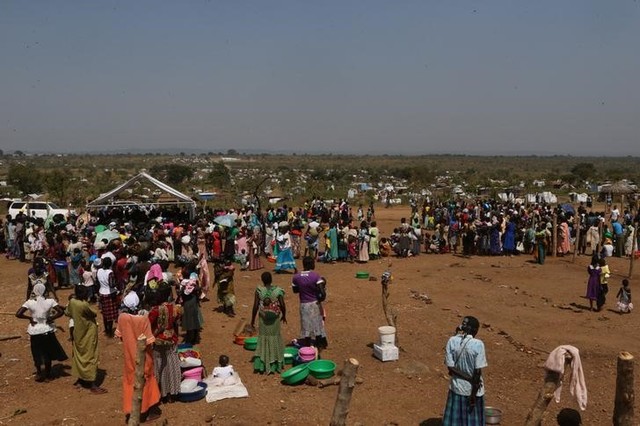Refugees recount South Sudan attack: “If you ran, you got shot”


It started out as a normal Monday morning in Pajok in South Sudan – children walking to school, shopkeepers raising their shutters and hawkers laying out their wares in the market, where a shower had just dampened down the dust.
Then, in the distance, came the rattle of machine gun fire as government soldiers from the Sudan People’s Liberation Army (SPLA) clashed with rebel SPLA-IO (SPLA-In Opposition) militiamen lurking in the bush.
Fearing the worst after three years of civil war in the world’s youngest nation, Pajok’s residents – most of them from the minority Acholi tribe – started to head for the safety of home.
None of them made it.
Before they could hide, Land Cruisers and pick-up trucks carrying heavily armed SPLA troops stormed into the town from the north, east and west, blocking escape routes.
According to the accounts of dozens of Pajok residents who made it 24 hours later to the safety of Uganda, 15 km (10 miles) to the south, they then unleashed four hours of slaughter on the trapped civilians.
Shocking in its brutality, such attacks have nevertheless become normal in a civil war marked increasingly by ethnic confrontation and reprisals against civilians.
The United Nations said in December it had evidence of ethnic cleansing by both sides as the conflict slid towards genocide, the ultimate nightmare for a nation that six years ago – heavily backed by the West – realised its dream of independence from Sudan.
Most of the SPLA is made up of members of the Dinka tribe, South Sudan’s largest and most dominant. President Salva Kiir is a Dinka.
Given the confusion and trauma among the more than 3,000 refugees sitting under trees and huts at the Ugandan border, it was impossible to piece together an accurate death toll. It is likely to be well into double figures.
One survivor, 17-year-old Oriem Pol, said a group of men including his father, Torencio, were arrested before being lined up against a wall and shot.
Torencio was only spared so he could dig the graves of his fellow townsmen. Once his job was done, he too was killed.
“They slaughtered him the next morning,” Oriem said, drawing his index finger across his throat as tears streamed down his dust-stained cheeks.
Beside him, his mother lay in the dirt beside the road, 15 metres from the Ugandan military checkpoint, too distraught to speak.
“FLUSH OUT” REBELS
In the capital, the government denied attacking civilians in Pajok, saying its forces were merely conducting an operation against SPLM-IO guerrillas.
“We decided to flush the SPLM-IO force out and as a result 16 soldiers were left on the ground with some number of individual weapons,” deputy SPLA spokesman Colonel Santo Domic Chol said.
“We have decided to deploy a detachment at Pajok permanently in order to take care of the civil population there.”
The rebels denied this account, saying the government forces had simply decided “to take the fight to civilians in Pajok centre”.
Ugandan intelligence officials on the border told Reuters rebel militiamen had been in the area, but said the attack on Pajok was unquestionably SPLA.
The refugees said the entire town, which refugees estimated as having a normal population of as many as 10,000, was now empty, a similar fate to many other ravaged communities across Equatoria, the fertile region bordering Uganda that is increasingly bearing the brunt of the fighting.
Around 1.5 million people have fled the fighting, more than 10 percent of the population. Nearly a million of those have gone to Uganda, which is struggling to cope with the influx.
“There is nobody there now. It is completely empty. If they catch anybody, they will kill them,” said a Pajok pastor, who identified himself only as Mondaa.
Others spoke of the terror the moment they realised they had been ambushed.
“If you ran, you got shot; if you got arrested, you got slaughtered,” said 35-year-old Lokang Jacky. “There were women who got shot. We just slept in the bush and then at 6 this morning we started walking.”
Tony Aborra, a 42-year-old peasant farmer, had to be carried to Uganda on the back of a bicycle due to a bullet lodged in his right heel.
“It was a stray bullet, maybe a kilometre away,” he said, grimacing as he unwound the handkerchief bandage around the wound.
Nurse Margaret Alloyo said the SPLA forces attacked the town’s hospital, ransacking wards and medical supplies while taking staff hostage.
“We just ran,” Alloyo said. “I spoke to a colleague at the hospital, but she said she had been detained. I don’t know what has happened to her. Now the calls do not go through.”